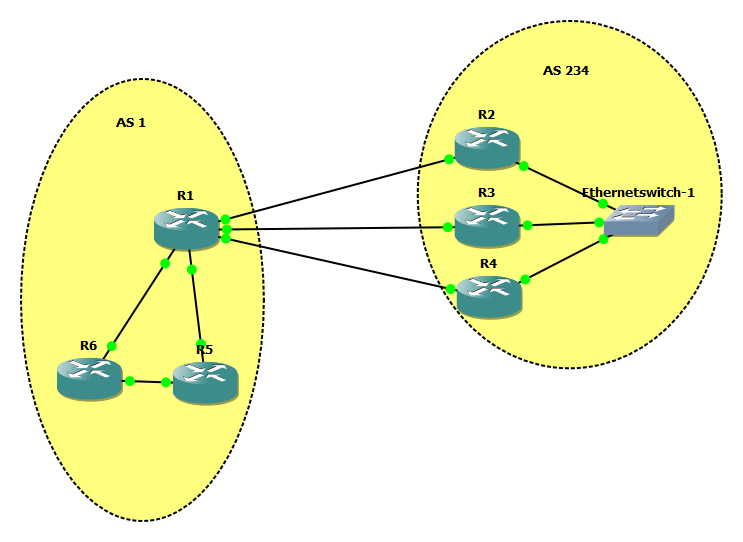Cisco - BGP mutlipath load sharing
Alasta 18 Juillet 2018 cisco cisco bgp ecmp multipath cli
Description : Utilisation de la feature BGP multipath
Description :
Nous allons voir le partage de charge BGP au travers du multipath.
Architecture du lab :

Configurations :
R1
router bgp 1
no synchronization
bgp router-id 1.1.1.1
bgp log-neighbor-changes
neighbor 10.1.2.2 remote-as 234
neighbor 10.1.3.3 remote-as 234
neighbor 10.1.4.4 remote-as 234
neighbor 10.1.5.5 remote-as 1
neighbor 10.1.6.6 remote-as 1
maximum-paths 3
maximum-paths ibgp 3
no auto-summarymaximum-paths 3 => path eBGP
maximum-paths ibgp 3 => path iBGP
R5 & R6 aux IP prêts
router bgp 1
no synchronization
bgp router-id 5.5.5.5
bgp log-neighbor-changes
network 10.5.6.0 mask 255.255.255.0
neighbor 10.1.5.1 remote-as 1
no auto-summaryR2, R3 & R4 aux IP prêts
router bgp 234
no synchronization
bgp router-id 2.2.2.2
bgp log-neighbor-changes
network 10.0.234.0 mask 255.255.255.0
neighbor 10.1.2.1 remote-as 1
no auto-summaryVérification :
Le show ip bgp sur R1 n’est pas trés parlant :
BGP table version is 9, local router ID is 1.1.1.1
Status codes: s suppressed, d damped, h history, * valid, > best, i - internal,
r RIB-failure, S Stale
Origin codes: i - IGP, e - EGP, ? - incomplete
Network Next Hop Metric LocPrf Weight Path
* 10.0.234.0/24 10.1.4.4 0 0 234 i
* 10.1.3.3 0 0 234 i
*> 10.1.2.2 0 0 234 i
* i10.5.6.0/24 10.1.6.6 0 100 0 i
*>i 10.1.5.5 0 100 0 iil faut soit voir la TDR :
R1#sh ip route
Codes: C - connected, S - static, R - RIP, M - mobile, B - BGP
D - EIGRP, EX - EIGRP external, O - OSPF, IA - OSPF inter area
N1 - OSPF NSSA external type 1, N2 - OSPF NSSA external type 2
E1 - OSPF external type 1, E2 - OSPF external type 2
i - IS-IS, su - IS-IS summary, L1 - IS-IS level-1, L2 - IS-IS level-2
ia - IS-IS inter area, * - candidate default, U - per-user static route
o - ODR, P - periodic downloaded static route
Gateway of last resort is not set
1.0.0.0/32 is subnetted, 1 subnets
C 1.1.1.1 is directly connected, Loopback0
10.0.0.0/24 is subnetted, 7 subnets
C 10.1.3.0 is directly connected, FastEthernet1/3
B 10.5.6.0 [200/0] via 10.1.6.6, 00:01:09
[200/0] via 10.1.5.5, 00:01:09
C 10.1.2.0 is directly connected, FastEthernet1/2
C 10.1.6.0 is directly connected, FastEthernet1/6
C 10.1.5.0 is directly connected, FastEthernet1/5
C 10.1.4.0 is directly connected, FastEthernet1/4
B 10.0.234.0 [20/0] via 10.1.4.4, 00:28:11
[20/0] via 10.1.3.3, 00:28:11
[20/0] via 10.1.2.2, 00:28:11soit regarder la table BGP par réseau :
R1#sh ip bgp 10.5.6.0
BGP routing table entry for 10.5.6.0/24, version 9
Paths: (2 available, best #2, table Default-IP-Routing-Table)
Multipath: eBGP iBGP
Advertised to update-groups:
1
Local
10.1.6.6 from 10.1.6.6 (6.6.6.6)
Origin IGP, metric 0, localpref 100, valid, internal, multipath
Local
10.1.5.5 from 10.1.5.5 (5.5.5.5)
Origin IGP, metric 0, localpref 100, valid, internal, multipath, bestR1#sh ip bgp 10.0.234.0
BGP routing table entry for 10.0.234.0/24, version 3
Paths: (3 available, best #3, table Default-IP-Routing-Table)
Multipath: eBGP iBGP
Advertised to update-groups:
1 2
234
10.1.4.4 from 10.1.4.4 (4.4.4.4)
Origin IGP, metric 0, localpref 100, valid, external, multipath
234
10.1.3.3 from 10.1.3.3 (3.3.3.3)
Origin IGP, metric 0, localpref 100, valid, external, multipath
234
10.1.2.2 from 10.1.2.2 (2.2.2.2)
Origin IGP, metric 0, localpref 100, valid, external, multipath, best